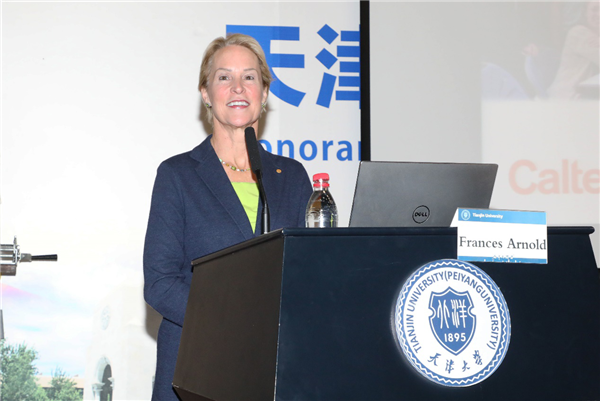Nobel laureate made honorary professor of Tianjin University
Nobel laureate Professor Frances Hamilton Arnold from the California Institute of Technology, or Caltech, gave a scientific talk to a packed audience in Tianjin University on Oct 16.
More than 500 students and teachers crowded into a lecture hall to listen her lecture, university officials said.
 |
| Frances Arnold delivering a talk about innovation by evolution. |
Frances Hamilton Arnold, an American chemical engineer and Nobel laureate, was awarded the Nobel Prize in Chemistry for pioneering the use of directed evolution to engineer enzymes in 2018.
She is the Linus Pauling Professor of Chemical Engineering, Bioengineering and Biochemistry at Caltech.
Earlier that day, Arnold was appointed as an honorary professor of Tianjin University by Tianjin University’s Party Secretary Li Jiajun. Yuan Yingjin, vice president of Tianjin University, anchored the appointment ceremony.
Li Jiajun said the university was greatly honored to grant Arnold the honorary title. “Seeing the students and teachers waiting to get into the lecture hall for Professor Arnold’s speech, they cherish the opportunity to get enlightenment from one of the world’s leading scientists,” Li said.
“It’s the university’s long-established policy to welcome all kinds of talent to join the faculty team.”
Professor Jay Siegel, dean of Tianjin University’s School of Pharmaceuticals Science and Technology, is an old friend of Arnold. He played a key role in promoting her visit to Tianjin University.
“We really appreciate Frances’ coming. She is a wonderful role model for all us here,” Siegel said.
“It’s not only about her academic achievements, but her background, her international experience, her openness and her passion for what she loves.”
During her lecture, Arnold talked about how the directed evolution strategy was used to create useful biological systems, especially enzymes.
By introducing mutations into the underlying sequences of proteins, her research team sped up the enzymes’ evolution and designed proteins that are well-suited to carry out biological tasks.
She said that as a result, enzymes had been designed to produce renewable fuels and pharmaceutical compounds with less harm to the environment.


















